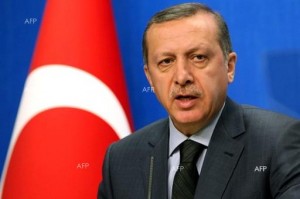 ANKARA, Dec. 18 (Xinhua) -- Turkey on Tuesday denied Iran's accusations, reiterating that the deployment of NATO's Patriot systems is for defense purposes only.
ANKARA, Dec. 18 (Xinhua) -- Turkey on Tuesday denied Iran's accusations, reiterating that the deployment of NATO's Patriot systems is for defense purposes only.Speaking at a press conference with his Portuguese counterpart, Turkish Prime Minister Recep Tayyip Erdogan told reporters that " We'll take steps in order to protect our country on the basis of authorization of international institutions."
"Patriot system is a defensive system and it doesn't operate as long as there is no attack against the country," Turkish Foreign Minister Ahmet Davutoglu told reporters in Ankara on Tuesday.
Protecting itself by using its national capacities and opportunities provided by NATO was "a right" for his country, Davutoglu said, adding that Iran should "give a clear message to the Syrian regime to end the oppression" rather than pointing the finger at Turkey.
Although Turkish officials have emphasized that the deployment of Patriot missiles is only for defense, Iranian officials expressed their deep concerns over the issue.
Ramin Mehmanparast, spokesman for Iran's Foreign Ministry, reiterated on Tuesday that NATO's deployment of Patriot missiles in Turkey is a "provocative" move. He said at weekly press conference that any "provocative" measures like deploying Patriot missiles in the Turkey-Syria border are at odds with the interests of regional countries, adding that such measures are the "root causes of instability and insecurity" in the region.
Iranian Defense Minister Brigadier General Ahmad Vahidi also told reporters Tuesday that "We have always announced that we are against the presence of foreign forces in the region and do not think it is in the interests of the Muslims," semi-official Fars news agency reported.
Vahidi was quoted as saying that the West has proved that it is not concerned about the interests of the Muslims in the region but minds the interests of its own.
On Saturday, Chairman of the Joint Chiefs of Staff of Iran's Armed Forces Major General Hassan Firouzabadi issued a stern warning to Turkey, saying that the deployment of Patriot systems was a part of a "Western plot to create a world war."
His criticism was followed by Iranian President Mahmoud Ahmadinejad's cancellation of his scheduled trip to Turkey's Konya province on Sunday.
Meanwhile, the official IRNA news agency reported that Iranian Foreign Minister Ali Akbar Salehi also criticized Turkey, saying that the deployment of Patriot systems would be "more provocative rather than deterrent, and will achieve nothing but to provoke and, God forbid, result in being forced into an uncalculated action."
Relations between Turkey and Iran have been getting tense since the unrest in Syria, on which the two neighboring countries fall apart as Ankara has given clear support to the Syrian opposition, while Tehran backed the rule of President Bashar al-Assad.
In 2011, the tension between Turkey and Iran has already mounted when Ankara decided to deploy NATO's early warning radar system in its southeastern district of Kurecik.
Iran regarded the move against itself and threatened to hit the NATO radar in the case of an attack from the West.
Turkey, a member of NATO, asked the alliance to deploy Patriot systems to protect its territory against Syria, after several Syrian shelling hit Turkish cities on the border which killed five Turkish nationals.
The possibility of a threat derived from chemical weapons which the Syrian government keeps was another reason for Turkey to protect its soil, according to Turkish officials.
At the request of Turkey, the NATO has agreed to provide six Patriot missiles to secure its member's border amid tensions with the Syrian government.
Although Ankara repeatedly underlined that the Patriot system was for defense of the country, not offensive or aiming any no-fly zone onto Syria, its relations with Tehran was further deteriorated as Iran thinks the move is a way for NATO to increase its military presence in the region.
By Xinhua
The Iran Project is not responsible for the content of quoted articles.










